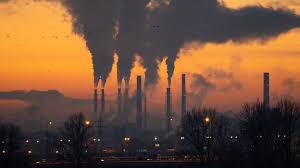
Delhi’s Air Quality Worsens in 2024: PM2.5 Levels Show Alarming Trends
As the new year begins, the Centre for Science and Environment (CSE) has unveiled a grim assessment of Delhi’s air quality for 2024. The findings highlight a persistent rise in particulate matter 2.5 (PM2.5) levels for the second consecutive year, revealing a worrying reversal of past gains in combating air pollution.
The annual PM2.5 concentration in Delhi rose to 104.7 micrograms per cubic meter (µg/m³) in 2024, marking a 3.4% increase from 2023. This figure is more than double the national ambient air quality standard of 40 µg/m³. According to CSE, the PM2.5 levels had seen a steady decline and stabilization between 2018 and 2022, but the recent uptick points to a deeper systemic challenge.
A Setback in Pollution Control
“This cannot be dismissed as an annual anomaly caused by meteorological factors,” said Anumita Roychowdhury, executive director, research and advocacy, CSE. “The consistent rise reflects the impact of growing pollution in the region. Delhi is losing the air quality gains achieved over the past decade, primarily due to the unchecked contribution of local and regional pollution sources such as vehicles, industries, waste burning, and construction dust.”
Roychowdhury emphasized that the capital can no longer blame stubble burning alone for its pollution woes. Despite a 71.2% drop in farm fire incidents during the October-December period of 2024, winter pollution levels remained elevated, disrupting the annual trend.
Sharanjeet Kaur, programme officer at CSE’s Urban Lab, added that real-time data from Delhi’s air quality monitoring stations showed a 26% surge in peak pollution levels during the early winter months of 2024. The city experienced 17 days of “severe” or worse air quality, accompanied by two extended smog episodes with average intensities of 371 µg/m³ and 324 µg/m³, respectively.
A Long-Term Analysis of Air Quality
CSE’s assessment examined air quality trends from 2018 to 2024, based on data from 37 continuous ambient air quality monitoring stations in Delhi-NCR. Using a rigorous methodology to clean and analyze data, the report painted a detailed picture of the worsening air quality.
Delhi’s annual PM2.5 levels, while 9.6% lower than the 2018 peak of 115.8 µg/m³, have reversed their earlier downward trend. In 2024, the average PM2.5 levels were 3% higher than the three-year average from 2021-2023, indicating a steady decline in air quality.
Winter Pollution: A Stagnant Crisis
Delhi’s winter PM2.5 average for October-December 2024 stood at 178.3 µg/m³, consistent with the levels recorded since 2018. However, peak pollution levels surged by 26% compared to 2023, with the citywide winter peak reaching 732 µg/m³. Two major smog episodes were recorded in November and December, lasting eight and four days, respectively.
While the city saw five “satisfactory” air quality days during the winter, there were no “good” air quality days. The number of “poor” and “very poor” air quality days remained unchanged, highlighting a stagnation in progress.
Stubble Burning: A Decline in Fires, but Not in Pollution
Farm stubble burning, often blamed for Delhi’s winter air quality woes, showed a significant decline in 2024. Fire incidents in Punjab and Haryana dropped by 71.2% during the October-December period compared to 2023. Despite this improvement, winter pollution levels in Delhi remained high, suggesting that other pollution sources play a critical role.
A Call for Systemic Change
CSE researchers warn that the rising PM2.5 levels in 2024 are a stark reminder of the need for urgent and systemic reforms. “The fact that pollution levels continue to rise, despite a drop in farm fire incidents, underscores the need for deeper structural changes to curb year-round emissions from various sources,” said Roychowdhury.
The report calls for a detailed roadmap to address sector-specific gaps, establish measurable targets, and mobilize resources for implementation. Without strong compliance and enforcement, Delhi risks further undoing its progress in air quality management.
As Delhi grapples with its worsening air quality, the findings from CSE serve as a sobering reminder that piecemeal measures are no longer enough. A robust and comprehensive strategy is essential to safeguard the health of the city’s residents and reverse the alarming trends in air pollution.